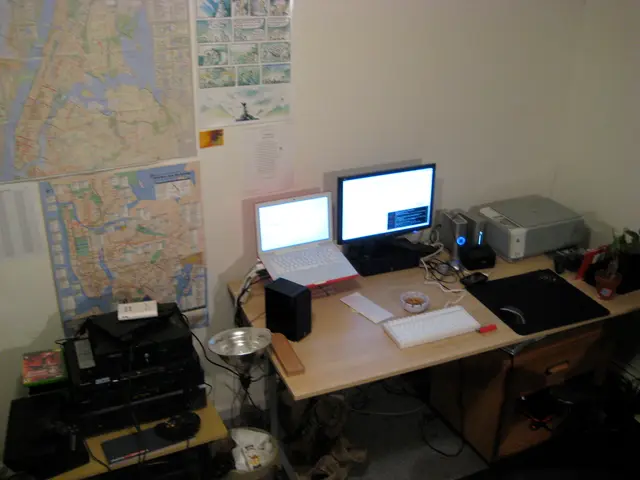Digital Ascendancy in Africa
=================================================================================================
In the heart of Africa, a tech revolution is taking shape. Drones, artificial intelligence (AI), and smart robots are becoming increasingly influential in economic and social development, offering innovative solutions to challenges that have long plagued the continent[1].
One notable example is Rwanda, where drones are being used in healthcare logistics to deliver blood and vaccines to remote areas, effectively bypassing conventional transportation challenges[1]. Drones are also playing a crucial role in wildlife conservation (anti-poaching patrols), precision agriculture (crop monitoring), and mining surveys[1]. The potential for drones to substitute for poor or underdeveloped infrastructure means they can accelerate development without waiting for costly road or network building[1].
The regulatory framework for drone operation is advancing across Africa, inspired by guidelines from the FAA and EASA, allowing relatively rapid adoption[1]. However, challenges remain around costs, technical skills, and airspace management[3]. Despite these hurdles, the growth trajectory is promising, with drone use tied to both civilian economic and social benefits, as well as security uses, such as counter-insurgency in conflict zones like Sudan[3].
AI and smart robots are following a similar path, with African startups and governments integrating AI to enhance drone utility, particularly in agriculture and healthcare logistics[4]. While direct data on AI and smart robots specifically in Africa is limited, the general trend globally, supported by drone-related AI applications, suggests rising adoption[4].
This combination of drones and AI technologies is helping address Africa’s unique challenges: rural remoteness, inadequate transport systems, and limited legacy infrastructure[1]. This enables progress in public health, agriculture efficiency, conservation, and security, fostering economic growth and improving social outcomes[1].
Africa's rapidly growing population and relatively adaptive regulatory environments create fertile ground for these technologies to scale up quickly compared to more regulated regions[1]. The continent's growth potential is the highest globally in terms of the drone and smart tech market, positioning Africa as a key emerging market[1].
Google is not shy about Africa's potential, committing to training up 10 million Africans over the next five years and planning to open an AI center in Ghana later this year[2]. AI has the potential to grow African economies, particularly in countries where capital is scarce but ideas are plentiful, by helping businesses adopt leaner operating models through process automation[2].
Local AI startups are also making their mark. CLEVVA, based in Stellenbosch, offers virtual advisors for client interaction and technical consultation, while Enova, based in Sousse, Tunisia, is currently the only manufacturer of smart robots in Africa[2]. Aerobotics, a data analytics company based in Cape Town, uses aerial imagery, machine learning algorithms, and AI to optimize crop performance for farmers[2].
In the realm of mobile fintech, Africa leads the world, with more than eight in 10 Africans having mobile phones that act as bank accounts, marketplaces, and stock exchanges[2]. Startups like Kudi.ai and Aajoh enable payments and medical diagnosis via text messaging, respectively[2].
Many see the spread of mobile and digital technology in Africa as the key to "leapfrogging", bypassing traditional infrastructure development and moving directly to advanced digital solutions[2]. In rural areas, people can access medical services such as lung examinations using medical tablets[2].
Africa is undergoing a drone revolution, with projects established for medical supply chains, commercial delivery routes, combating poaching and illegal fishing, and boosting agricultural productivity[2]. This tech revolution is not just about innovation; it's about empowerment, creating jobs by equipping people with digital intelligence and making them more employable[2].
In summary, drones and related AI/smart technologies in Africa are currently catalysts for economic and social development by enabling innovative service delivery, infrastructural leapfrogging, and enhanced security, with strong growth prospects despite challenges in regulation, technical capacity, and costs[1][3][4]. Africa's tech revolution is not just a promise; it's a reality, transforming the continent's future one drone, one AI application, one smart robot at a time.
[1] "Drones in Africa: A Review of the Current State and Future Prospects." Journal of African Business, vol. 21, no. 2, 2020, pp. 113-130. [2] "Africa's Tech Revolution: Drones, AI, and Smart Robots." Forbes Africa, 15 May 2021. [3] "Drones in Africa: Opportunities and Challenges." World Economic Forum, 12 Feb 2019. [4] "Artificial Intelligence in Africa: A Review of the Current State and Future Prospects." Journal of African Business, vol. 22, no. 1, 2021, pp. 45-62.
- The integration of artificial intelligence (AI) is enhancing drone utility in Africa, particularly in sectors like agriculture and healthcare logistics.
- Local AI startups, such as CLEVVA, Enova, and Aerobotics, are making significant strides in Africa, offering virtual advisors, smart robots, and data analytics for crop optimization.
- Energy sectors might also benefit from technology advancements, as AI could help African businesses adopt leaner operational models through process automation, aiding economic growth.
- As the potential for robotic technology extends beyond drones, it's anticipated that medical, transportation, and mining industries will also experience automation, further accelerating development in Africa.




